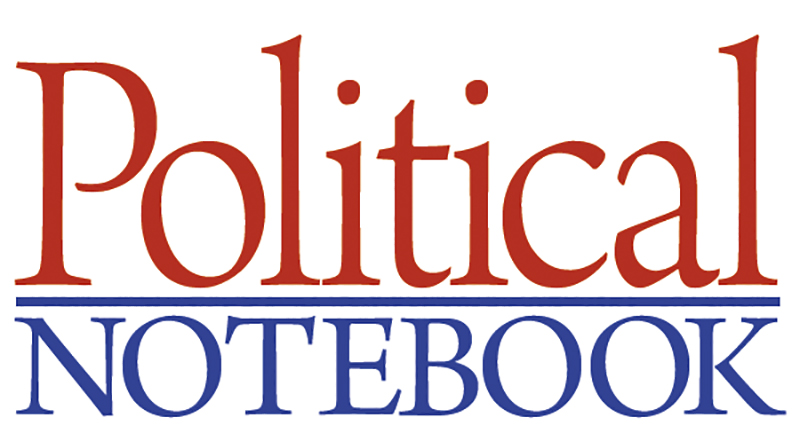Political Notebook: Catawba College’s Bitzer estimates unaffiliated registration to become largest voting group this year
Published 12:04 am Tuesday, January 4, 2022
After evaluating voter registration data across the state, Dr. Michael Bitzer, political science professor at Catawba College, predicted unaffiliated voter registrations could become the largest voting block by the spring.
Bitzer created and regularly contributes blogs on the website Old North State Politics. In a blog published Monday, Bitzer described where North Carolina’s voter pool stands at the beginning of mid-term election year as well as who registered and switched parties in 2021.
As of Dec. 25, the state reports 7.2 million registered voters. Data show the number of registered Republicans and Democrats declined from January 2021 to Christmas Day, but unaffiliated voter registration increased by more than a percentage point. Democrats now comprise the plurality of North Carolina voters at 34.7%, Republicans comprise 30.3% and unaffiliated voters make up 34.3% of the voter pool.
Voter registration in Rowan shows the county is still mostly Republican, but unaffiliated registration is on the rise. As of December, there are a total of 95,898 voters in Rowan County, up from 94,179 registered voters in January 2021. Republicans comprise the majority at 40,940. There are 24,019 registered Democrats. However, unaffiliated registration grew the most from January 2021 to December, with 1,437 additional registrations contributing to the current 30,381 unaffiliated voters in Rowan County.
The county also gained an additional 2,120 registrations between September 2020 and November 2020, which was when the general election was held. All three parties during that period saw an increase, with the largest increase going to Republicans.
About 300,000 North Carolinians registered to vote in 2021, with August seeing the largest registration increase. More than 40% of those new voters were Generation Z. Data shows voters under the age of 40, which includes Millennials and Generation Z, comprise more than a third of the state’s voter pool, with Baby Boomers accounting for 29%. Generation Z, the youngest voters, make up the largest unaffiliated registration (41%) compared to other generations. Bitzer said this is indicative of a trend for older voters remaining “partisan adherents.”
Voters across central cities and urban areas comprise 55% of the state’s voter pool, with only 27% in suburban areas and 18% in rural areas. Unaffiliated registration has also taken the lead in urban areas, with Republicans dominating suburban areas and an almost evenly divided makeup in rural areas.
“The party registrations show the unaffiliated’s influence, while within the partisan registrations, the central cities continue their Democratic dominance as compared to the Republican strength in surrounding suburban and rural counties,” Bitzer said. “The battlegrounds of the urban suburbs show a nearly even divide between partisan registrations.”
In assessing the data, Bitzer estimates unaffiliated registration will become largest voting block by April.
“Taking as a conservative estimate the 2021 average monthly percentage gains for the big three registration statuses, and then projecting as the monthly changes in 2022, it would appear that the cross-over point for unaffiliated voters taking the lead should be in April,” Bitzer said. “(This) is a ‘conservative’ estimate because we may see increased numbers in the run-up to May’s tentative primary election. But it would appear that in the middle of spring, unaffiliateds should claim the mantel of largest group of NC’s voters.”
To read the full analysis, visit oldnorthstatepolitics.com.
More than 40% of North Carolinians feel public schools on wrong track, HPU Poll finds
A recent statewide survey from High Point University shows more than 40% of North Carolinians feel the state’s public schools are on the wrong track.
The survey was conducted from Nov. 11 to Nov. 19 among 867 North Carolina adults. Only 31% indicated that public education is headed in the right direction, with 43% indicating the opposite. About 26% did not offer an opinion one way or the other.
More than half, 65%, indicated that teachers are paid too little, while 51% of those respondents indicated they’d be willing to pay more in taxes to raise teacher pay to the national average within five years. The survey also showed North Carolina residents generally support a statewide bond referendum to fund an estimated $8 billion to $10 billion backlog in construction and renovation (61%).
On average, adults gave local public schools a “C+” for mitigation of COVID-19 and overall quality, with only 16% grading pandemic response with an “A” and 24% grading schools with a “B.” By contrast, only 9% of respondents graded schools with an “A” for overall quality and 21% grading them with a “B.”
Almost half, 48%, said the state should grade schools on an A-F system like students are graded, while 31% were opposed to such ratings. About 42% indicated ratings that report the quality of schools should emphasize overall improvement scores over proficiency scores. About 25% said they should be graded for both.
Nearly 30% indicated teachers have the biggest influence on schools, followed by 26% saying it should be parents, 24% saying legislators and 9% saying school principals.
The survey also asked about residents’ perception of respect for North Carolina educators and elected officials. Steve Bingham, a professor at HPU’s Stout School of Education, said findings showed the “bottom line” is that “things are looking up, but there’s more work ahead.”
“Once again, the HPU Poll demonstrates the average North Carolina taxpayer’s respect for public school teachers, principals and superintendents, and their willingness to pay more for them,” Bingham said. “Appreciating the challenge of in-flight redesign amid the continuing turbulence of COVID-19, four in 10 citizens rewarded their local school’s response with top marks. On the other hand, the average school squeaked by with a Gentleman’s C. Finally, that two-thirds of citizens believe schools are best rated by student growth, or a combination of growth and proficiency, suggests continuing erosion of public trust in test scores alone as an appropriate measure of merit.”




